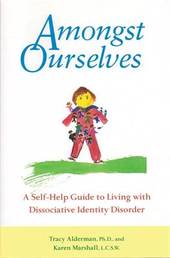
|
Amongst Ourselves: Self-help Guide to Living with Dissociative Disorder
Paperback / softback
Main Details
| Title |
Amongst Ourselves: Self-help Guide to Living with Dissociative Disorder
|
| Authors and Contributors |
By (author) Tracy Alderman
|
|
By (author) Karen Marshall
|
| Physical Properties |
| Format:Paperback / softback | | Pages:176 | | Dimensions(mm): Height 229,Width 153 |
|
| Category/Genre | Coping with illness
Self-help and personal development |
|---|
| ISBN/Barcode |
9781572241220
|
| Classifications | Dewey:616.8523 |
|---|
| Audience | |
|---|
|
Publishing Details |
| Publisher |
New Harbinger Publications
|
| Imprint |
New Harbinger Publications
|
| Publication Date |
27 October 1998 |
| Publication Country |
United States
|
Description
"Amongst Ourselves" porvides a first-person account of what it's like to live with DID and strategies to help sufferers improves their lives. It explains how to find a therapist, manage confusing and self-destructive behaviors, evaluate treatment procedures, and "come out" to others.
Author Biography
Tracy Alderman, Ph.D., is a licensed clinical psychologist who lives in San Diego, California. She is director of research and a core-faculty member at the University for Humanistic Studies, an adjunct instructor of psychology at Chapman University, and a staff psychologist for the California Department of Corrections. Dr. Alderman consults, lectures, and writes on a variety of topics. She is author of "The Scarred Soul: Understanding & Ending Self-Inflicted Violence." Karen Marshall, L.C.S.W., is a licensed clinical social worker. She is executive director of the Lesbian and Gay Men's Community Center in San Diego.
Reviews"This book will be a valuable tool not only for those working at living with DID/MPD but also for family, friends, therapists and others seeking to understand and support these interesting and complex people. Tracy Alderman and Karen Marshall have delivered not only a practical guide full of useful exercises and activities, but also a refreshing and delightful look at the healing process through the eyes and voices of the 'little ones.' The perspective of the 'dissociated identities' brings the experience alive and may change the way DID is viewed by many." --Pamela M. Badger, M.S., M.F.C.C., therapist and member of the International Society for the Study of Dissociation
|